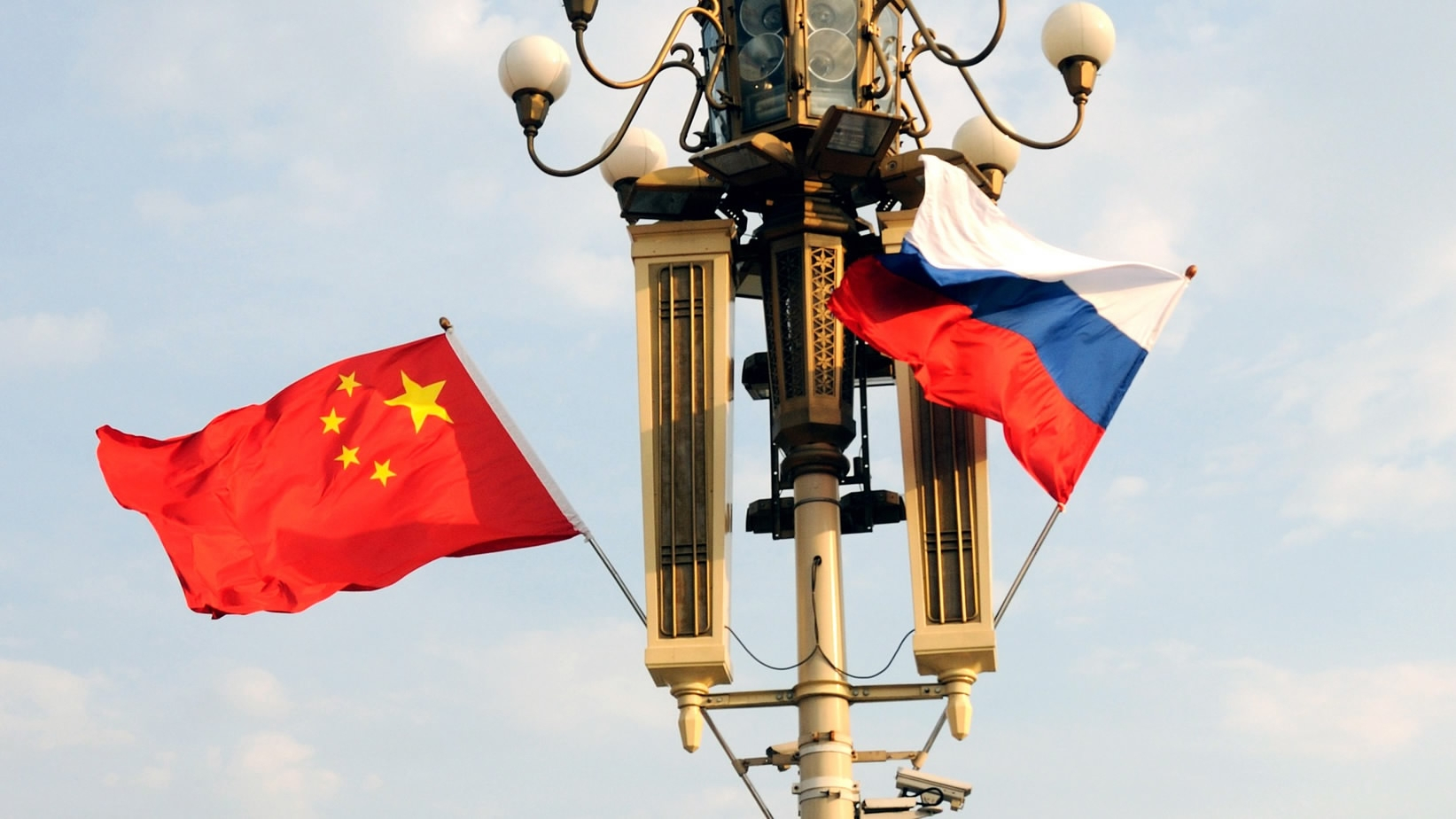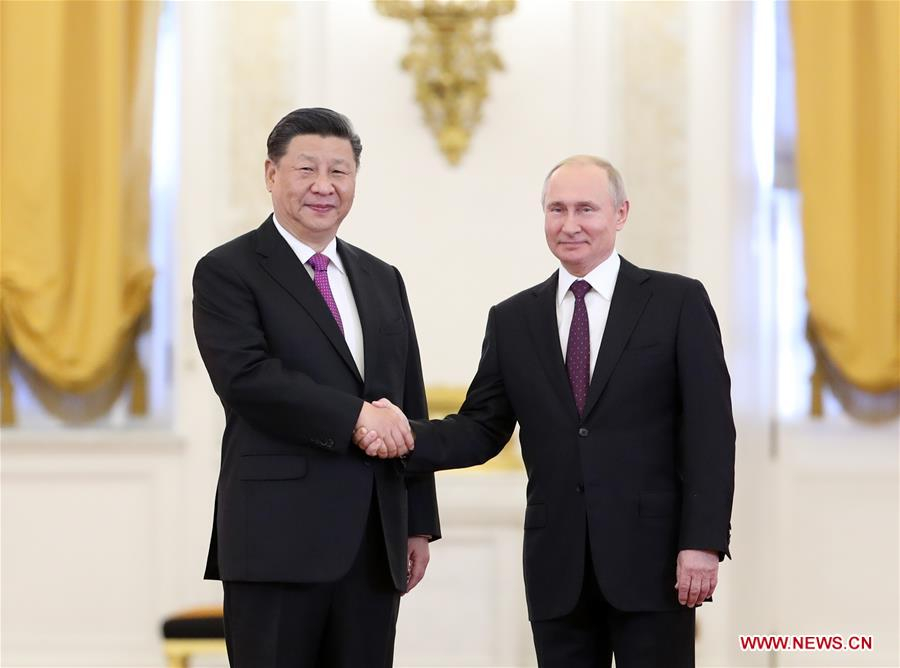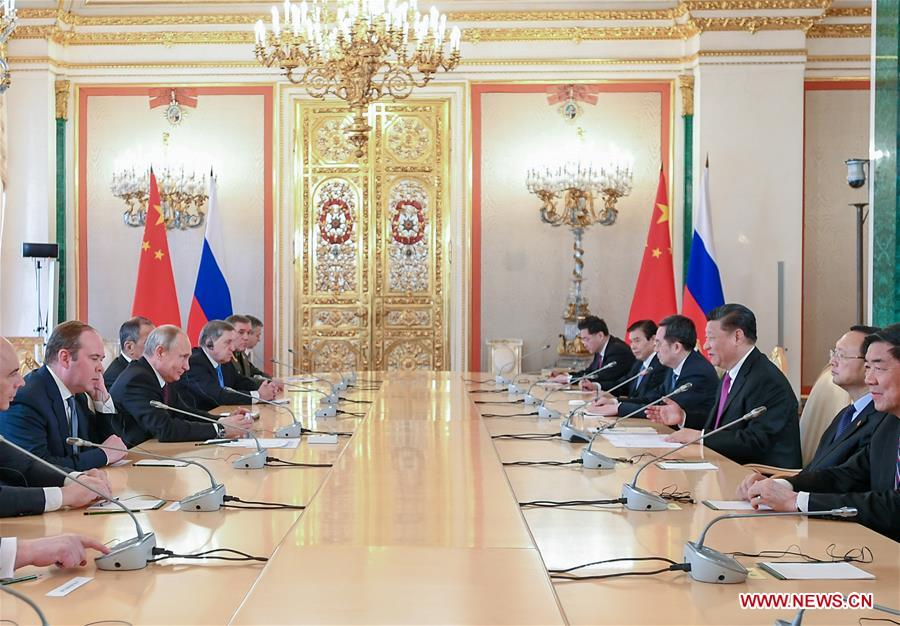
Opinion
10:16, 10-Jun-2019
Why the Sino-Russian top-level partnership is not a new kind of cold war
Xu Fangqing

Editor's note: Xu Fangqing is a senior editor at China News Week and an observer of Northeastern Asia and China's neighboring countries. The article reflects the author's views, and not necessarily those of CGTN.
With the advent of the 70th anniversary of bilateral diplomatic ties, Beijing and Moscow have updated their bilateral relations as "a comprehensive strategic partnership of coordination for a new era" which demonstrates the cause of this new relationship as well as the reflections of both countries' perceptions regarding the current world order.
As one of the most active summits, Chinese President Xi Jinping and his Russian counterpart inked the joint statement to endorse the "better-than-ever" Sino-Russian ties during Xi's successful visit to the continent-crossing country early in June.
After the upheaval in the 1990s, China and Russia consistently advanced their ties from a constructive partnership to today's unprecedented level based on their own development and the global situation. Beijing and Moscow have stepped onto a stable and fast track to coordinate on regional and global issues, especially over the past decade.
As two countries that foster favorable political and economic ties, on the one hand, the two neighbors have got an internal driving force to engage with each other. On the other hand, the pressure from the U.S. squeezes Beijing and Moscow to cooperate more closely, especially after Donald Trump took office and the conservatives manipulated the final say on U.S. foreign policies.
President Putin's Russian renaissance as a world power contradicts the U.S. plot to contain Russia by NATO as a regional country and part of the European continent.
Therefore, disagreements and conflicts between the U.S. and Russia never calmed down such as the battles in Ukraine and global affairs like Syria, Cuba and Venezuela.

Chinese President Xi Jinping (L) shakes hands with his Russian counterpart Vladimir Putin while posing for photos ahead of their talks in Moscow, Russia, June 5, 2019. /Xinhua Photo
Chinese President Xi Jinping (L) shakes hands with his Russian counterpart Vladimir Putin while posing for photos ahead of their talks in Moscow, Russia, June 5, 2019. /Xinhua Photo
Likewise, China as a rising power now seeks to its new position in the Western Pacific Region and the world, and beyond which is at odds with U.S. long-term dominance anticipation.
A good example of such kind of contradiction between China and America is about the China-proposed Belt and Road Initiative. The U.S. took this initiative as a potential threat towards its existence in the Western Pacific Region and thus tried to undermine it by preventing its allies from joining.
Naturally, as two permanent members of the UN Security Council, China and Russia seek to walk together on their concerning issues, not to mention the strong traditional bilateral friendship.
Apart from that, the personal relations between President Xi and President Putin and their styles of leadership also contribute to the current Sino-Russian relations. Seeking a berth of global powers, the two presidents both devote to steering their countries as leading members of the international community.
Given that the two countries now have come to the consensus that they need to bolster their cooperation at a higher level to meet the grave challenges they face in the new era, two statements committing to strengthening strategic stability and around 30 inter-governmental and commercial agreements have been inked during President Xi's state visit.
According to those agreements, Russia announces to enlarge its soybean exports to China and Russia's mobile phone operator will cooperate with China's Huawei to develop 5G technology in Russia. China also expressed its synergic stance with Russia on issues concerning Syria, Iran, the Korean Peninsula and other regions.

Chinese President Xi Jinping and his Russian counterpart Vladimir Putin hold talks at the Kremlin in Moscow, Russia, June 5, 2019. /Xinhua Photo
Chinese President Xi Jinping and his Russian counterpart Vladimir Putin hold talks at the Kremlin in Moscow, Russia, June 5, 2019. /Xinhua Photo
However, the advancement of the Sino-Russian partnership does not mean they have formed an alliance. The two leaders themselves have also clarified their partnership will not be directed against any other party.
It's clear that as two global powers, China and Russia target to secure their core interests by supporting each other without any sacrifice of their independence. But any alignment would abandon independence as a premise.
Though Moscow and Beijing have upgraded their relationship to a new high level, we still see the cooperation is flexible and independent instead of compulsory, ideology-oriented or targeted against a third party.
Therefore, a legible message that passes to the rest of the world is that the bilateral relationship is reasonable and has definitely nothing to do with a new kind of cold war.
Besides, China and Russia should also show the world how bilateral coordination will benefit the two sides and beyond. Hence more cases of Sino-Russian collaboration should be implemented to cast light on doubts about the China-Russia top-level partnership.
(If you want to contribute and have specific expertise, please contact us at opinions@cgtn.com.)

SITEMAP
Copyright © 2018 CGTN. Beijing ICP prepared NO.16065310-3
Copyright © 2018 CGTN. Beijing ICP prepared NO.16065310-3